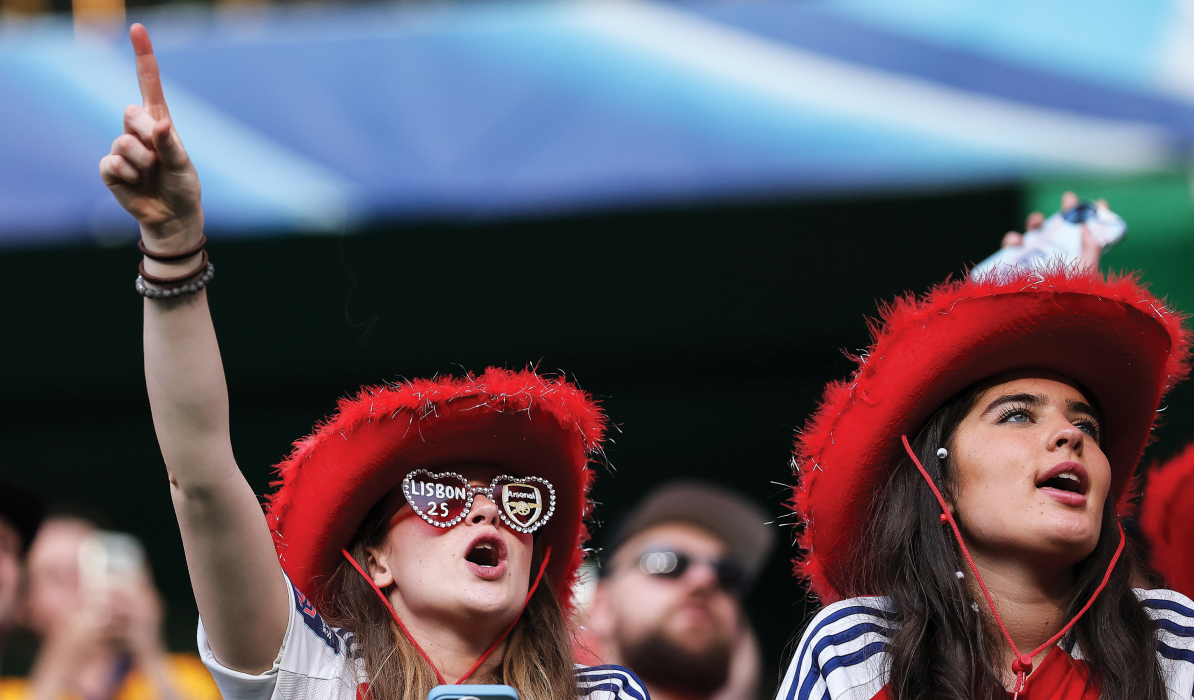
There’s a very famous line from Bobby Robson in which he asks the rhetorical question: “What is a club, in any case?” Forgive me for quoting it as, if you’re reading this magazine, you almost certainly already know it. But one of the answers he gives to his own question is this: “It’s a small boy clambering up stadium steps for the very first time, gripping his father’s hand, gawping at that hallowed stretch of turf beneath him and, without being able to do a thing about it, falling in love.”
As someone who has been going to football games with their dad since they were a very small child, this quote has always resonated deeply with me. In all but one regard – I’ve never been a small boy. Hello, my name’s Lizzie. Nice to meet you.

I spent a lot of time during the formative years of my life at a football club – specifically, my beloved Watford FC – and they are some of the most vivid memories of my childhood. My dad worked at the club back then, and took me – and later my sister – to most home games. The sounds, the smells, the atmosphere of those early matches have stayed with me, just as Sir Bobby said they would.
As a kid at games with my dad, I would always pester him with lots of vaguely annoying questions when he was trying to focus on the match. One of my favourite queries, which quickly became my ultimate ambition in life, was asking whether a woman could become the manager of the England men’s team. He would always patiently tell me that, yes, she could, “if she was good enough”, which I loved hearing. Of course, as an adult, I know that this isn’t really true; we’ve come a long way, but I still think my dream of being the next Gareth Southgate may be something of a long shot.
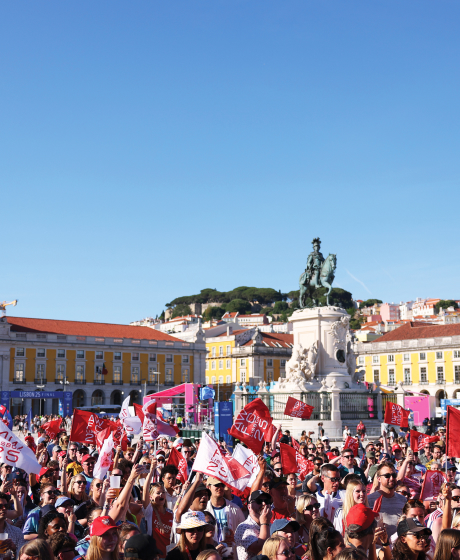
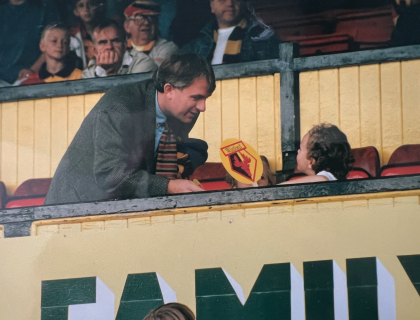
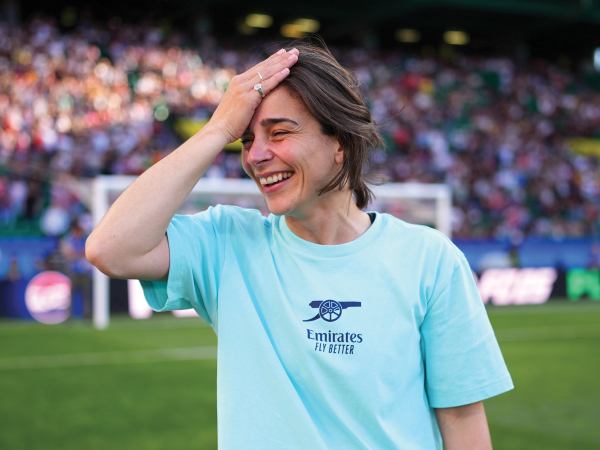
Attending the Women’s Champions League final in Lisbon, I initially couldn’t quite figure out why the sight of Arsenal manager Renée Slegers on the touchline was making me feel emotional. She was wearing the same kit as all the other Arsenal training staff members, so for a while I didn’t even realise who she was. She’s very young for an elite football coach, only a couple of years older than me, and is very slight and serious, keeping her emotions under wraps during what must have been the most intense 90 minutes of her professional career.
I realised after a while that it was really just the very fact of seeing her there, doing her job, and this not being some remarkable thing, that I was finding poignant. A lot of the top women’s teams are still managed by men; in England’s Women’s Super League, just a third of the teams had female coaches at the start of last season. In fact, Slegers’ opposite number that day was a man, Barcelona’s Pere Romeu. Watching her sprint onto the pitch with utter joy at the final whistle, as Arsenal won the biggest trophy of all in a shock 1-0 result, really brought home just how far we have come from the days of my childhood idly dreaming of a professional managerial career.
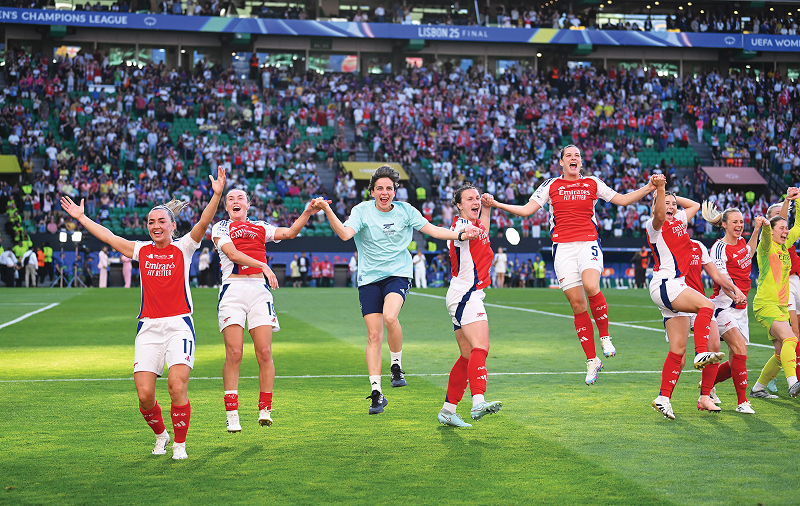
To be fair, I had already been primed to get a little bit emotional by what I’d seen on my way out to the game and wandering around Lisbon beforehand. On the flight to the Portuguese capital, all across the city, at the stadium and then again on my flight home, were a parade of dads and daughters, making the trip together to see Arsenal on the ultimate stage, taking me back to those formative memories of mine. There were plenty of Barcelona-supporting dads and daughters too, of course, but being English, growing up supporting a team based not too far from Arsenal, the London fans hit home in a more personal way.
My dad and I still go to games to this day, and football is a massive part of our relationship. He’s always been an equal-opportunities kind of dad – he used to tell off boys for not passing to me in my Sunday league – but women’s football just didn’t have the kind of visibility and access that it has now. Seeing so many women and girls with their dads in Lisbon really brought home to me what so many impact reports can’t quite get across – the game has changed. It really has. Everywhere I looked in Lisbon, I saw evidence of that.

The vibe in the city throughout my stay was one of a giant celebration, before and long after the game. The city was absolutely packed with Arsenal and Barcelona fans, with everyone proudly wearing their club colours and demonstrating their allegiances in vibrant and creative ways. The atmosphere was loud, raucous and tribal, but also overwhelmingly joyous. It felt like a great big party – for the teams having made it to the showpiece, yes, but also a celebration of just how far women’s football has come in such a short time.
Arsenal’s eventual win was another important step forward in the journey women’s football has been on in recent years. When the final whistle blew, I was so happy – not because I’m an Arsenal fan (I don’t think my dad would appreciate that, somehow) – but because I knew how good this result was for women’s football as a whole. Barcelona are an incredibly dominant team, and deservedly so, but the last time a club other than Barça or Lyon won this competition was ten years ago. Having the Gunners’ name on the trophy brings some much-needed variety to the top tier of women’s football.
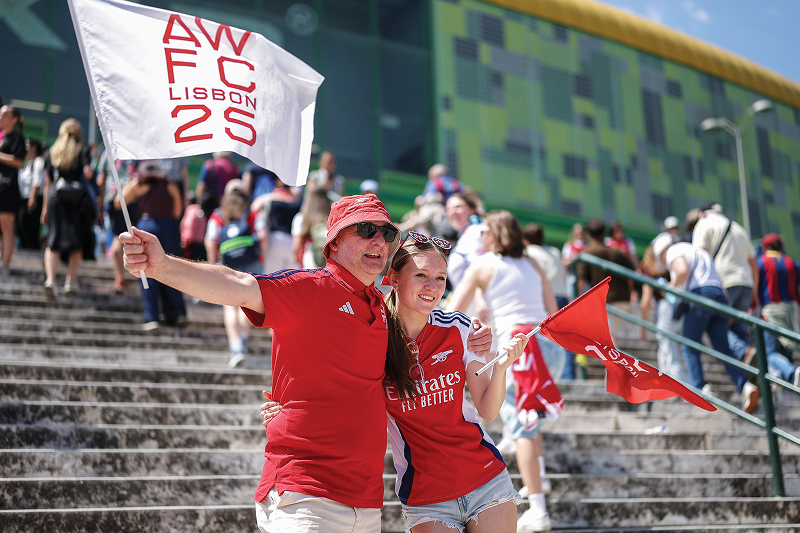
Next season, the competition will get a further refresh with the introduction of the new format that has been such a success in the men’s competitions, and the addition of another women’s tournament, the inaugural Women’s Europa Cup, will open up the game even more to new teams and players. The future isn’t just bright, it’s basically blinding.
Back in the stadium, as I watched Slegers celebrate with her players, and the Barcelona team commiserate with one another on the pitch, an interview that Barça midfielder and current Ballon d’Or holder Aitana Bonmatí gave to this magazine a few issues back came to mind. In that interview, she listed her footballing idols from her childhood: Pep Guardiola, Xavi Hernández, Andrés Iniesta and Sergio Busquets. All incredible, inspirational players, but notably also all men. As I witnessed the players collecting their medals, with young women and girls – and their dads – celebrating all around me, it struck me that the female football stars of tomorrow, and all the other small girls making memories in the stands, won’t need to find their icons and career aspirations from the men’s game. These days, the women’s game has plenty of heroes of its own.
There’s a very famous line from Bobby Robson in which he asks the rhetorical question: “What is a club, in any case?” Forgive me for quoting it as, if you’re reading this magazine, you almost certainly already know it. But one of the answers he gives to his own question is this: “It’s a small boy clambering up stadium steps for the very first time, gripping his father’s hand, gawping at that hallowed stretch of turf beneath him and, without being able to do a thing about it, falling in love.”
As someone who has been going to football games with their dad since they were a very small child, this quote has always resonated deeply with me. In all but one regard – I’ve never been a small boy. Hello, my name’s Lizzie. Nice to meet you.

I spent a lot of time during the formative years of my life at a football club – specifically, my beloved Watford FC – and they are some of the most vivid memories of my childhood. My dad worked at the club back then, and took me – and later my sister – to most home games. The sounds, the smells, the atmosphere of those early matches have stayed with me, just as Sir Bobby said they would.
As a kid at games with my dad, I would always pester him with lots of vaguely annoying questions when he was trying to focus on the match. One of my favourite queries, which quickly became my ultimate ambition in life, was asking whether a woman could become the manager of the England men’s team. He would always patiently tell me that, yes, she could, “if she was good enough”, which I loved hearing. Of course, as an adult, I know that this isn’t really true; we’ve come a long way, but I still think my dream of being the next Gareth Southgate may be something of a long shot.



Attending the Women’s Champions League final in Lisbon, I initially couldn’t quite figure out why the sight of Arsenal manager Renée Slegers on the touchline was making me feel emotional. She was wearing the same kit as all the other Arsenal training staff members, so for a while I didn’t even realise who she was. She’s very young for an elite football coach, only a couple of years older than me, and is very slight and serious, keeping her emotions under wraps during what must have been the most intense 90 minutes of her professional career.
I realised after a while that it was really just the very fact of seeing her there, doing her job, and this not being some remarkable thing, that I was finding poignant. A lot of the top women’s teams are still managed by men; in England’s Women’s Super League, just a third of the teams had female coaches at the start of last season. In fact, Slegers’ opposite number that day was a man, Barcelona’s Pere Romeu. Watching her sprint onto the pitch with utter joy at the final whistle, as Arsenal won the biggest trophy of all in a shock 1-0 result, really brought home just how far we have come from the days of my childhood idly dreaming of a professional managerial career.

To be fair, I had already been primed to get a little bit emotional by what I’d seen on my way out to the game and wandering around Lisbon beforehand. On the flight to the Portuguese capital, all across the city, at the stadium and then again on my flight home, were a parade of dads and daughters, making the trip together to see Arsenal on the ultimate stage, taking me back to those formative memories of mine. There were plenty of Barcelona-supporting dads and daughters too, of course, but being English, growing up supporting a team based not too far from Arsenal, the London fans hit home in a more personal way.
My dad and I still go to games to this day, and football is a massive part of our relationship. He’s always been an equal-opportunities kind of dad – he used to tell off boys for not passing to me in my Sunday league – but women’s football just didn’t have the kind of visibility and access that it has now. Seeing so many women and girls with their dads in Lisbon really brought home to me what so many impact reports can’t quite get across – the game has changed. It really has. Everywhere I looked in Lisbon, I saw evidence of that.

The vibe in the city throughout my stay was one of a giant celebration, before and long after the game. The city was absolutely packed with Arsenal and Barcelona fans, with everyone proudly wearing their club colours and demonstrating their allegiances in vibrant and creative ways. The atmosphere was loud, raucous and tribal, but also overwhelmingly joyous. It felt like a great big party – for the teams having made it to the showpiece, yes, but also a celebration of just how far women’s football has come in such a short time.
Arsenal’s eventual win was another important step forward in the journey women’s football has been on in recent years. When the final whistle blew, I was so happy – not because I’m an Arsenal fan (I don’t think my dad would appreciate that, somehow) – but because I knew how good this result was for women’s football as a whole. Barcelona are an incredibly dominant team, and deservedly so, but the last time a club other than Barça or Lyon won this competition was ten years ago. Having the Gunners’ name on the trophy brings some much-needed variety to the top tier of women’s football.

Next season, the competition will get a further refresh with the introduction of the new format that has been such a success in the men’s competitions, and the addition of another women’s tournament, the inaugural Women’s Europa Cup, will open up the game even more to new teams and players. The future isn’t just bright, it’s basically blinding.
Back in the stadium, as I watched Slegers celebrate with her players, and the Barcelona team commiserate with one another on the pitch, an interview that Barça midfielder and current Ballon d’Or holder Aitana Bonmatí gave to this magazine a few issues back came to mind. In that interview, she listed her footballing idols from her childhood: Pep Guardiola, Xavi Hernández, Andrés Iniesta and Sergio Busquets. All incredible, inspirational players, but notably also all men. As I witnessed the players collecting their medals, with young women and girls – and their dads – celebrating all around me, it struck me that the female football stars of tomorrow, and all the other small girls making memories in the stands, won’t need to find their icons and career aspirations from the men’s game. These days, the women’s game has plenty of heroes of its own.
There’s a very famous line from Bobby Robson in which he asks the rhetorical question: “What is a club, in any case?” Forgive me for quoting it as, if you’re reading this magazine, you almost certainly already know it. But one of the answers he gives to his own question is this: “It’s a small boy clambering up stadium steps for the very first time, gripping his father’s hand, gawping at that hallowed stretch of turf beneath him and, without being able to do a thing about it, falling in love.”
As someone who has been going to football games with their dad since they were a very small child, this quote has always resonated deeply with me. In all but one regard – I’ve never been a small boy. Hello, my name’s Lizzie. Nice to meet you.

I spent a lot of time during the formative years of my life at a football club – specifically, my beloved Watford FC – and they are some of the most vivid memories of my childhood. My dad worked at the club back then, and took me – and later my sister – to most home games. The sounds, the smells, the atmosphere of those early matches have stayed with me, just as Sir Bobby said they would.
As a kid at games with my dad, I would always pester him with lots of vaguely annoying questions when he was trying to focus on the match. One of my favourite queries, which quickly became my ultimate ambition in life, was asking whether a woman could become the manager of the England men’s team. He would always patiently tell me that, yes, she could, “if she was good enough”, which I loved hearing. Of course, as an adult, I know that this isn’t really true; we’ve come a long way, but I still think my dream of being the next Gareth Southgate may be something of a long shot.



Attending the Women’s Champions League final in Lisbon, I initially couldn’t quite figure out why the sight of Arsenal manager Renée Slegers on the touchline was making me feel emotional. She was wearing the same kit as all the other Arsenal training staff members, so for a while I didn’t even realise who she was. She’s very young for an elite football coach, only a couple of years older than me, and is very slight and serious, keeping her emotions under wraps during what must have been the most intense 90 minutes of her professional career.
I realised after a while that it was really just the very fact of seeing her there, doing her job, and this not being some remarkable thing, that I was finding poignant. A lot of the top women’s teams are still managed by men; in England’s Women’s Super League, just a third of the teams had female coaches at the start of last season. In fact, Slegers’ opposite number that day was a man, Barcelona’s Pere Romeu. Watching her sprint onto the pitch with utter joy at the final whistle, as Arsenal won the biggest trophy of all in a shock 1-0 result, really brought home just how far we have come from the days of my childhood idly dreaming of a professional managerial career.

To be fair, I had already been primed to get a little bit emotional by what I’d seen on my way out to the game and wandering around Lisbon beforehand. On the flight to the Portuguese capital, all across the city, at the stadium and then again on my flight home, were a parade of dads and daughters, making the trip together to see Arsenal on the ultimate stage, taking me back to those formative memories of mine. There were plenty of Barcelona-supporting dads and daughters too, of course, but being English, growing up supporting a team based not too far from Arsenal, the London fans hit home in a more personal way.
My dad and I still go to games to this day, and football is a massive part of our relationship. He’s always been an equal-opportunities kind of dad – he used to tell off boys for not passing to me in my Sunday league – but women’s football just didn’t have the kind of visibility and access that it has now. Seeing so many women and girls with their dads in Lisbon really brought home to me what so many impact reports can’t quite get across – the game has changed. It really has. Everywhere I looked in Lisbon, I saw evidence of that.

The vibe in the city throughout my stay was one of a giant celebration, before and long after the game. The city was absolutely packed with Arsenal and Barcelona fans, with everyone proudly wearing their club colours and demonstrating their allegiances in vibrant and creative ways. The atmosphere was loud, raucous and tribal, but also overwhelmingly joyous. It felt like a great big party – for the teams having made it to the showpiece, yes, but also a celebration of just how far women’s football has come in such a short time.
Arsenal’s eventual win was another important step forward in the journey women’s football has been on in recent years. When the final whistle blew, I was so happy – not because I’m an Arsenal fan (I don’t think my dad would appreciate that, somehow) – but because I knew how good this result was for women’s football as a whole. Barcelona are an incredibly dominant team, and deservedly so, but the last time a club other than Barça or Lyon won this competition was ten years ago. Having the Gunners’ name on the trophy brings some much-needed variety to the top tier of women’s football.

Next season, the competition will get a further refresh with the introduction of the new format that has been such a success in the men’s competitions, and the addition of another women’s tournament, the inaugural Women’s Europa Cup, will open up the game even more to new teams and players. The future isn’t just bright, it’s basically blinding.
Back in the stadium, as I watched Slegers celebrate with her players, and the Barcelona team commiserate with one another on the pitch, an interview that Barça midfielder and current Ballon d’Or holder Aitana Bonmatí gave to this magazine a few issues back came to mind. In that interview, she listed her footballing idols from her childhood: Pep Guardiola, Xavi Hernández, Andrés Iniesta and Sergio Busquets. All incredible, inspirational players, but notably also all men. As I witnessed the players collecting their medals, with young women and girls – and their dads – celebrating all around me, it struck me that the female football stars of tomorrow, and all the other small girls making memories in the stands, won’t need to find their icons and career aspirations from the men’s game. These days, the women’s game has plenty of heroes of its own.


